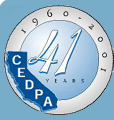

DataBus - Vol 41 No. 2: February-March, 2001
|
Recent Legislative Updates
Children's Internet Protection Act Internet Filtering will now be required to receive Erate funds or Federal funds.
"President Clinton signed into law the Children's Internet Protection Act on December 21, 2000. That law, attached to the omnibus appropriations law during the last days of the 106th Congress, will require schools and libraries that receive funding under either Title III of the Elementary and Secondary Education Act or the Museum and Library Services Act, or that receive universal service discounts for Internet access ("E-rate") to adopt an Internet safety policy incorporating the use of filtering or blocking technology on computers with Internet access. "Section 1721 applies to schools and libraries for computers with Internet access as a condition of receiving discounts from the Universal Service Fund. (Recipients of discounts for basic telephone service are excluded.)" (Excerpts from http://www.sl.universalservice.org/whatsnew/CIPA020101.asp.) Another summary of this new federal law can be found at http://www.cde.ca.gov/erate/e-ratehr4577.pdf. The summary was put together by Van Wilkinson for a presentation to CCSESA. Basically, the law states that if you want to continue or start to get Erate funding, you better get a filtering policy in place. The law states that the protection measures must be in place by October 1, 2001 (120 days after the start of the next funding year). If you haven't heard about this you need to read Van's summary or the SLD summary. Additionally, if you would like to comment on the FCC's interpretation of the law and their implementation of it you can do so as described below from the Universal Services Web Page (http://www.sl.universalservice.org/whatsnew/default.asp#020101) The Notice of Proposed Rule Making adopted by the Federal Communications Commission on the implementation of the Children's Internet Protection Act (CHIP Act) has been published in the Federal Register on January 31, 2001. The notice can be found on pages 8374-8377 of the Federal Register, Vol. 66, No. 21, for Wednesday, January 31, 2001. It is available on the web in both text and PDF versions as the only entry under the "Federal Communications Commission" heading on the Federal Register (http://www.access.gpo.gov/su_docs/fedreg/a010131c.html) web site. Comments are due on or before February 15, 2001. Reply comments are due on or before February 22, 2001. Addresses for filing comments are available under the heading "ADDRESSES" at the beginning of the notice.
AB2882 The Education Technology Grant Program for High Schools (AB2882) will provide $175 million in grants to eligible school districts and charter schools. The goal of the program is Advanced Placement but also lowering the student to computer ratio. It will provide $1500 per computer to lower the ratio to eligible schools, funding permitting.The following is now available on the Office of the Secretary of Education's Web site. Official letters to Districts were mailed the middle of January. http://www.ose.ca.gov/edtech/index.html There are specific rules that must be followed with this program. In a nutshell, the funding is sent to the district and the district purchases the computers. There are strict guidelines on what can be purchased (minimum standards). $1500 has been allocated per computer. Districts are allowed to use any difference of what it costs to buy the computers and the $1500 to purchase more computers or to purchase the necessary infrastructure to get the equipment on the network. Districts are also required to take an assurances page to their board for approval. Charter Schools must have the Director sign the assurances page. The funding must be encumbered by June 30th. The machines do not have to be installed until the following year. What is the remaining timeline?
* These dates are set in statute or regulations. |
CEDPA